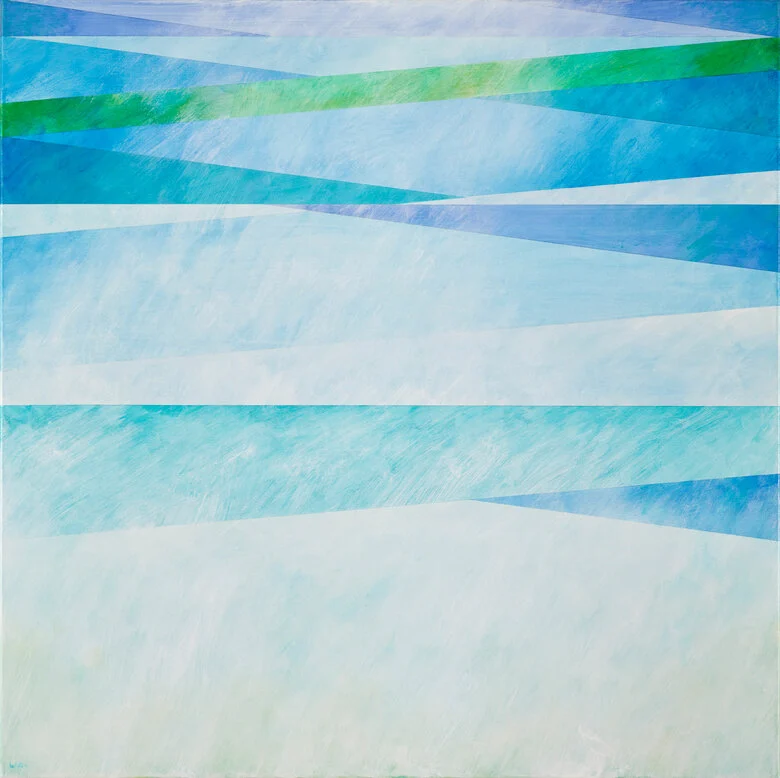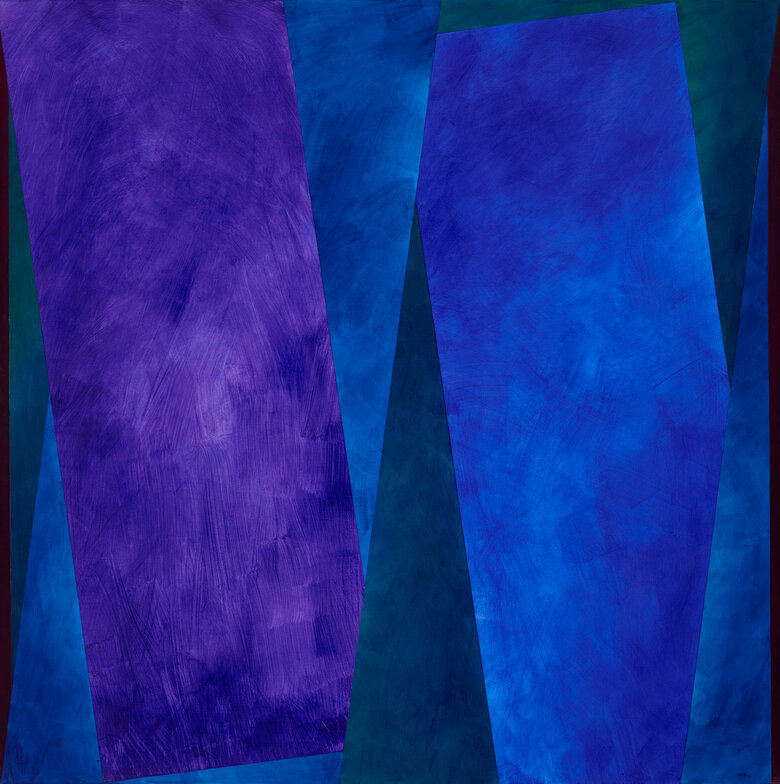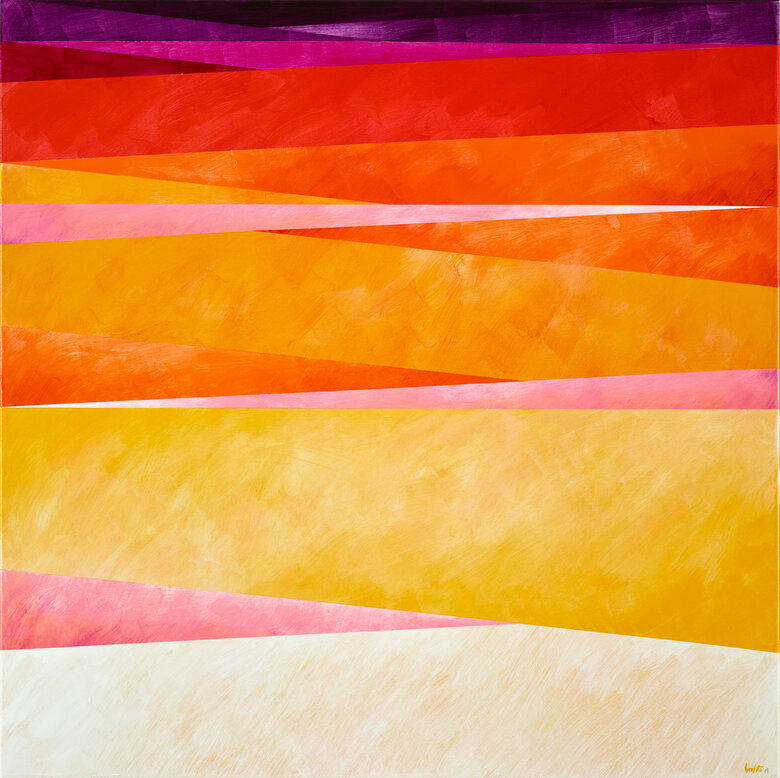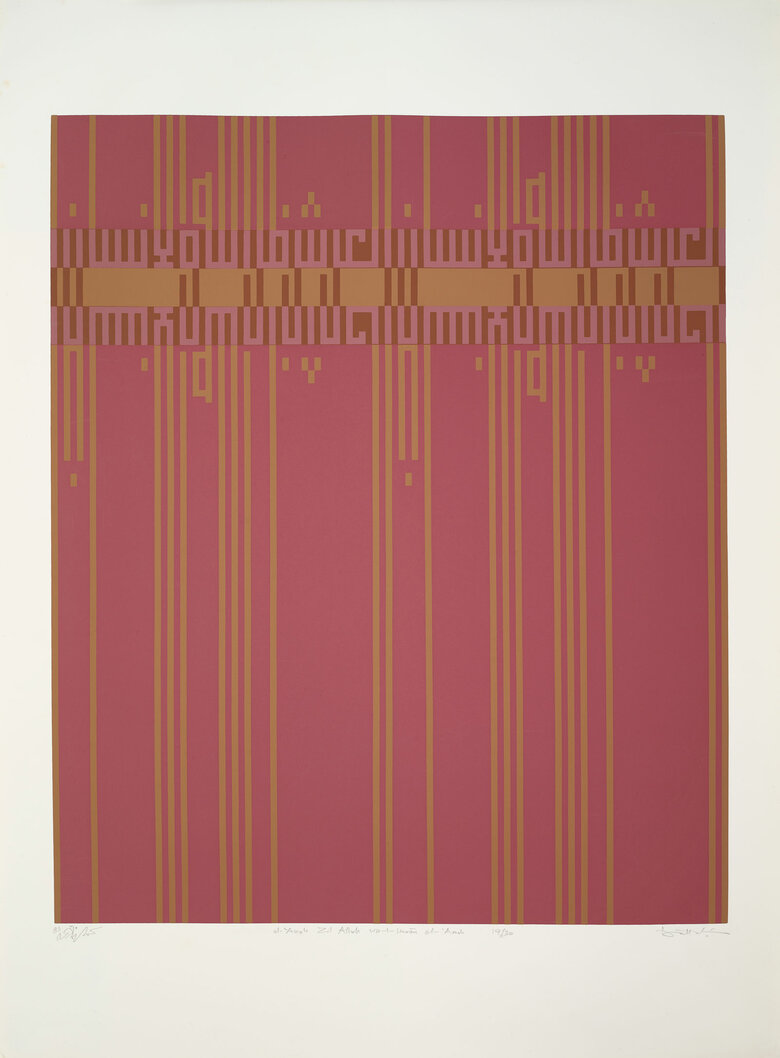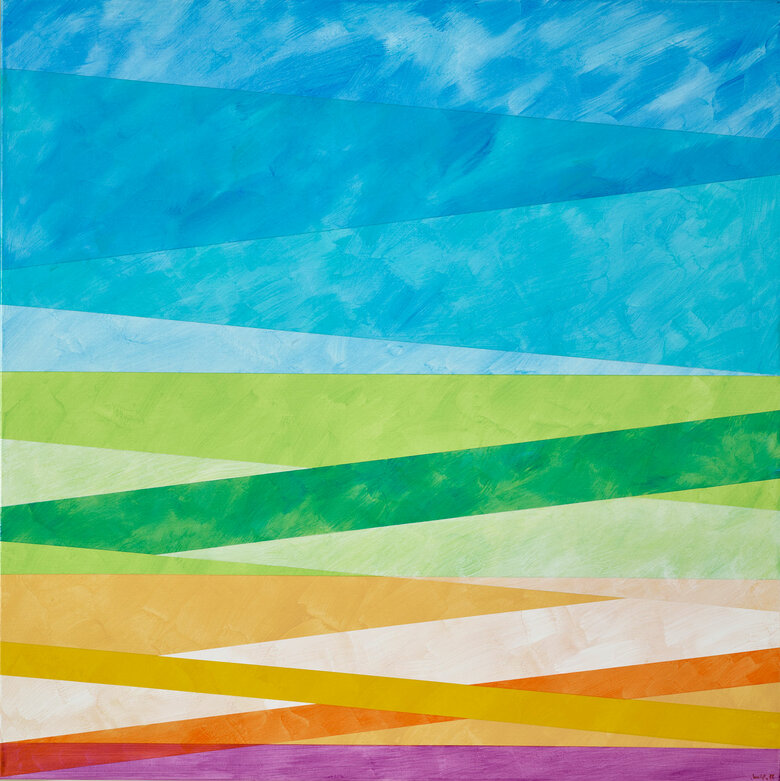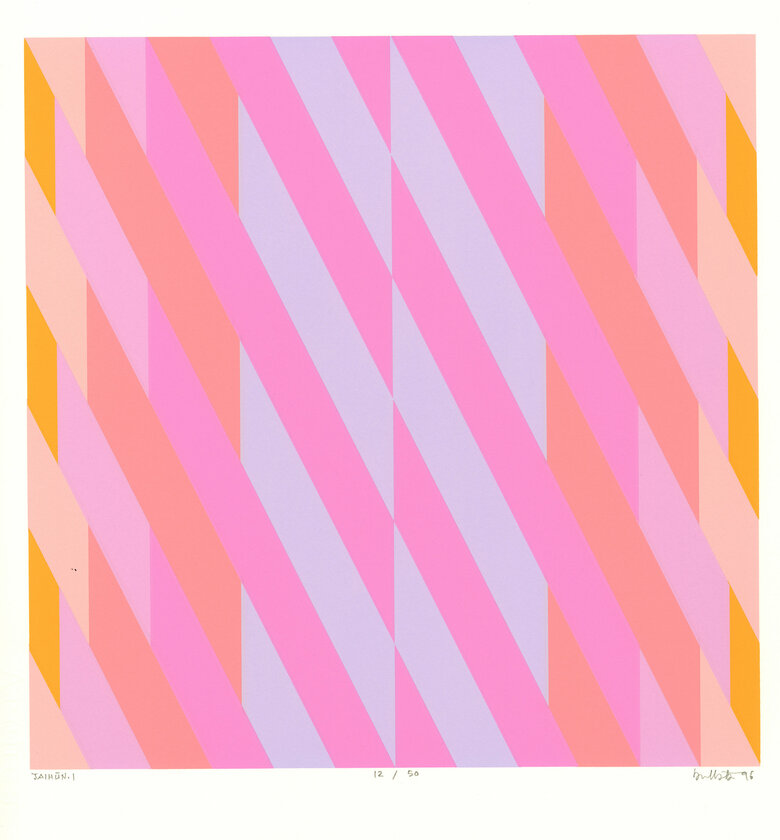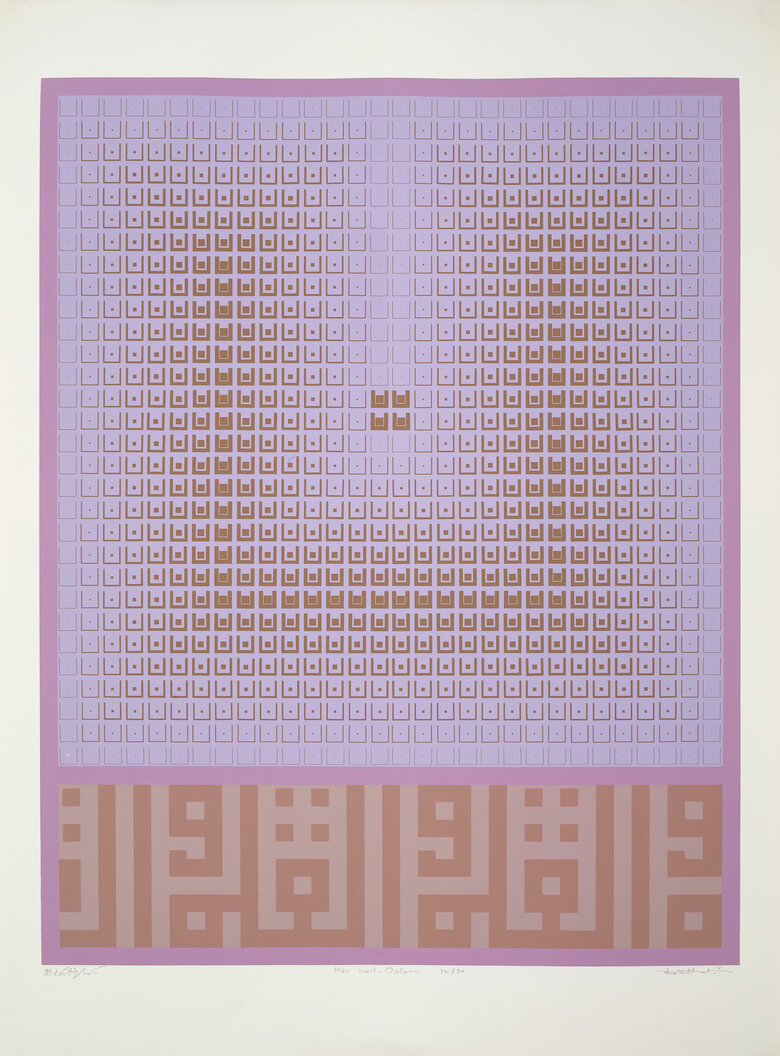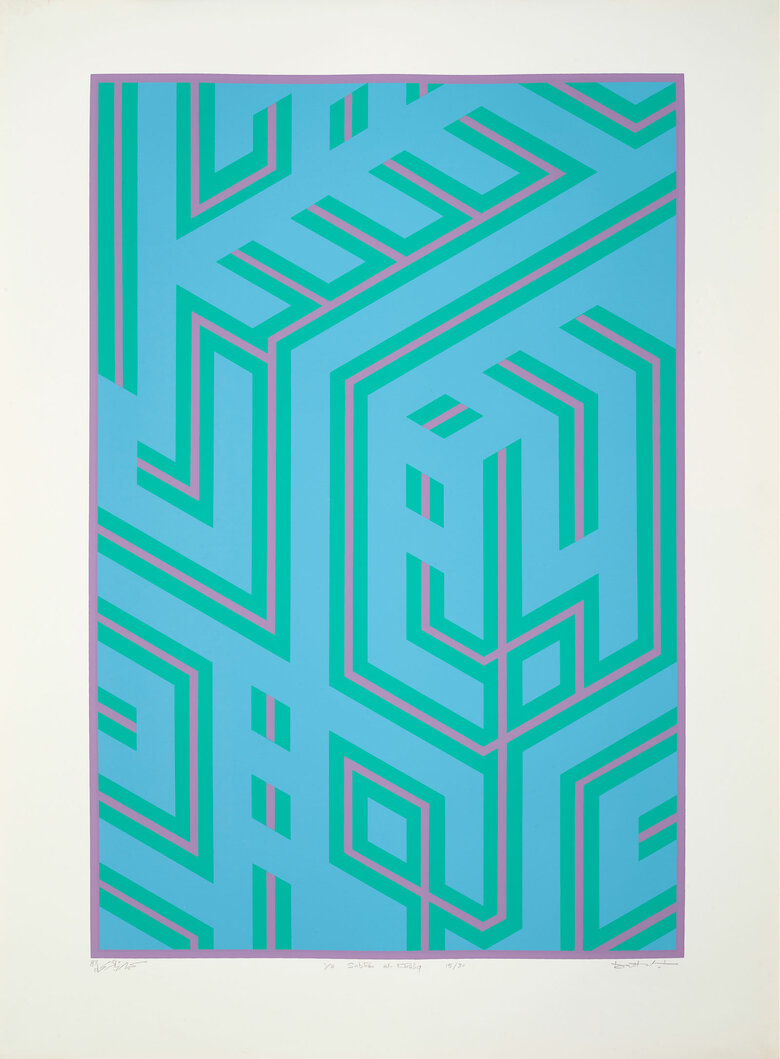Kamal Boullata was born in Jerusalem in 1942. He earned a degree in fine arts from the Academia di Belle Arti in Rome and from 1968 to 1971 continued his studies at the Corcoran School of the Arts...
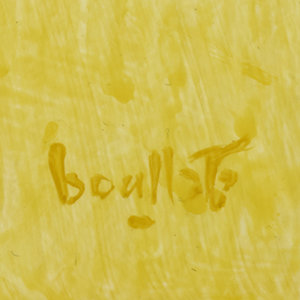

KAMAL BOULLATA, Palestine (1942 - 2019)
Bio
Written by L’Or Imane Puymartin & Christine Labban
Kamal Boullata was born in Jerusalem in 1942. He earned a degree in fine arts from the Academia di Belle Arti in Rome and from 1968 to 1971 continued his studies at the Corcoran School of the Arts and Design in Washington, D.C. Boullata taught at Georgetown University while producing his work and in 1993 was granted the Fulbright Senior Scholar Fellowship to research Islamic art in Morocco. He lived and worked between Paris and Morocco throughout the ‘90s and currently lives in Berlin. In addition to making his own work, Boullata is a leading historian of Palestinian art; his Palestinian Art From 1850 to the Present remains the most comprehensive survey written on the topic of modern art in Palestine.
Boullata grew up in the Christian Quarter of the Old City of Jerusalem, and this experience was integral to his development as an artist. At age eight, he began studying with Palestinian icon painter Khalil Halaby and, for the next five years, learned to paint from photographs using the grid method, as Halaby used in crafting his icons. Though he began with religious icons, Boullata’s true passion as a young artist was painting from life; Jerusalem’s cityscapes, streets, souks, architecture, and people flooded his early canvases and would continue to play into his work following his eventual turn to abstraction. Of course, the tumultuous history of modern Palestine impacted Boullata, who grew up in the Jordanian-controlled sector of a newly-divided Jerusalem. With the Zionist conquest of West Jerusalem in 1948, the city began to change rapidly under the Israeli regime of militarized urban planning. Even while living in a city divided by barbed wire and militias, however, Boullata’s spirits were lifted by the solidarity that united Jerusalem’s Palestinian community across religious differences.
Boullata was always fascinated with Arabic script, particularly the geometric Kufic style, which would come to play a significant role in his mature oeuvre. The inscriptions on the Dome of the Rock were a primary source of this passion; as a child, the artist would spend hours visiting the sacred monument, which he would sketch to bring home some of its beauty.
Though Boullata spent most of his adult life away from Jerusalem, his hometown remains salient in his creations. The Kufic script he so admired as a child has become central to his oeuvre, appearing in the colorful silkscreens that have become the artist’s trademark. These appear, at first, to be patterns or abstract compositions, but upon closer inspection include repetitive phrases that are frequently derived from Arabic maxims, the Bible, and the Holy Qur’an. Boullata creates these harmonious compositions from the books of all three Abrahamic religions, perhaps to suggest the importance of transcending religious divisions and asserting the unity of his homeland. Furthermore, he frequently plays with common religious phrases to re-code them in a secular, humanistic framework. An example of this can be found in La Ana Ila Ana (1983), which references the Muslim profession of faith, “There Is No God But God,” but which means, instead, “There Is No I But I.”
Kamal Boullata’s silkscreen work reflects an encounter between Islamic and Byzantine aesthetics as well as his own visual and verbal memory. His creative, methodical use of Arabic script can illustrate Hurufiyya, a set of aesthetic principles originating in the mid-twentieth century that seeks to combine tenets of Western modernism with Islamic traditions of calligraphy. One of the most inspirational figures in Boullata’s work was Hasan Ibn al-Haytham (Alhazen) (c. 965-1040), the renowned medieval optician and master aesthetician. Alhazen’s observations left a mark on the history of conceptual aesthetics and resonated with Boullata’s studies on the relationship between sight, perception, and color. Boullata commemorated Alhazen in his 2009 exhibition Homage to al-Hasan Ibn al-Haytham, a collection of geometric, iridescent silkscreen compositions at Artspace Gallery in Dubai.
In addition to his silkscreens, the artist is well known for abstract geometric compositions painted in acrylic on canvas. He has described creating these works as a process that goes from the mechanical to the organic: he begins with a pencil, compass, and ruler to create a mathematical rendering, and once a pattern forms in his work, it becomes a skeleton ready to receive color as flesh. Just as his calligraphic works pull from historical and cultural sources, his abstract works frequently reference ancient and mythological events: the series Bilqis (2014), named after the legendary Queen of Sheba, exemplifies this angle. According to the story, the pagan Bilqis first encountered the monotheistic King Solomon in his crystal palace, where the transparent floors were so reflective that she mistook them for water and lifted her skirt to avoid wetting its hem. Amazed, the queen nevertheless asked Solomon a series of riddles; when he solved them all, she acknowledged his great wisdom and converted to monotheism. In his series of abstract paintings, Boullata translates the aesthetics of fragmentation and transparency that gave Solomon’s floors their silky mirror effect.
A leader in Palestinian modern art and art history, Boullata passed away in August 2019.
Sources
Ankori, Gannit. "Palestinian Art." Amazon.com: Palestinian Art . Accessed October 25, 2017. https://www.amazon.com/Palestinian-Art-Gannit-Ankori/dp/1861892594.
Barakat, Alexander. "An Interview with Kamal Boullata ." Contemporary Practices. Accessed October 25, 2017. http://www.contemporarypractices.net/artistessay/Kamal%20Boullata.pdf.
Boullata, Kamal, and Samar Faruqi. Bilqis. Dubai: Meem Editions, 2014.
Boullata, Kamal. ...And there was light: an exhibition of 7 acrylics on canvas & 12 works on paper: 23 September - 31 October 2015. London: Berloni Gallery, 2005.
Boullata, Kamal, and John Berger. Palestinian art: from 1850 to the Present.London: Saqi, 2009.
"Interview with artist Kamal Boullata ." Barjeel Art Foundation. March 31, 2015. Accessed October 25, 2017. http://www.barjeelartfoundation.org/wordpress/wp-content/uploads/2015/03/Interview-with-artist-Kamal-Boullata_BAF.pdf.
CV
Selected Solo Exhibitions
2021
Kamal Boullata – Geometrie des Lichts, Galerie Pankow, Berlin, Germany
2020
Kamal Boullata: Qasida, Meem Gallery, Dubai, United Arab Emirates
2019
Kamal Boullata, Espace Claude Lemand, Paris, France
2018
Kamal Boullata: A Survey of Recent Painting, Warehouse 421 Mina Zayed, Abu Dhabi, UAE
2017
Adolcendo,Meem Gallery, Dubai, UAE
2015
…And There Was Light, Berloni Gallery, London, UK
2014
Bilqis, Meem Gallery, Dubai, UAE
2013
Bilqis, Wiensowski & Harbord, Berlin, Germany
2009
Homage to al-Hasan Ibn al-Haytham, ArtSpace Gallery, Dubai, UAE
2002
Mare Nostrum, Musée du Chateau Dufresne, Montreal, Canada
Livres d’ Artiste, Bibliothèque Centrale, Grenoble, France
2001
Confluences Nord/Sud, Galerie d’art contemporain, Palais de l’Europe, Menton, France
1999
Eppur si muove, Galerie Claude Lemand, Paris, France
1998
Granada, Patronato de la Alhambra Islamic Museum, Carlos V Palace, Granada, Spain
Surrat al-Ard, Darat al-Funun, Amman, Jordan
Twelve Lanterns for Granada, Khalil Sakakini Cultural Centre, Ramallah, Occupied Palestine
1991
Symmetries, Alif Gallery, Washington DC, USA
1990
Houghston House Art Gallery, Hobbart and William Smith Colleges, Geneva, NY, USA
1988
School of Fine Arts Gallery, Indiana University, Bloomington, IN, USA
1985
Geometry of Words, Alliance Française, Abu Dhabi, UAE
1984
National Gallery of Fine Arts, Amman, Jordan
Geometry of Words, Al-Hakawati Gallery, Jerusalem, Occupied Palestine
Arti et Amicitiae, Amsterdam, Netherlands
1983
Thomas Evans Gallery, Smithsonian Institution, Washington, DC, USA
Selected Group Exhibitions
2024
Arab Presences: Modern Art And Decolonisation: Paris 1908-1988, Musée d'Art Moderne de Paris, Paris, France
Hudood: Rethinking boundaries, The Brunei Gallery, SOAS, Bloomsbury, London, UK
2023
The Future Of Traditions, Writing Pictures Contemporary Art From The Middle East, The Brunei Gallery, SOAS, Bloomsbury, London, UK
Ce que la Palestine apporte au monde, Institute du Monde Arabe, Paris, France
2021
Zaat: Collectors Eye, Fann A Porter, Dubai, United Arab Emirates
Converging Lines: Tracing the Artistic Lineage of the Arab Diaspora in the U.S., MEI Art Gallery, Middle East Institute, Washington, USA
2020
Taking Shape: Abstraction from the Arab World, 1950-1980s, Grey Art Gallery, New York University; Mary and Leigh Block Museum of Art, Northwestern University, Illinois; Herbert F. Johnson Museum, Cornell University, New York; McMullen Museum of Art at Boston College; University of Michigan Museum of Art; US
Modern Masters, Meem Gallery, Dubai, United Arab Emirates
2016
Arab Print: Volume II,Meem Gallery, Dubai, UAE
The Sea Suspended: Arab Modernism from the Barjeel Collection, Tehran Museum of Contemporary Art, Iran
2015
Art International, Istanbul, Turkey
Debating Modernism II,Whitechapel Gallery, London, UK
Adventures of the Black Square: Abstract Art and Society 1915-2015, Whitechapel Gallery, London, UK
2014
Tariqah, Barjeel Art Foundation, Sharjah, UAE
2013
Changing Agents, Alaan Artspace, Riyadh, Saudi Arabia
Tajreed,CAP Kuwait, Kuwait
2009
Palestine: La creation dans tous ses états, Institut du Monde Arabe,Paris, France
2008
Modernité plurielle. Art arabe contemporain, Institut du Monde Arabe, Paris, France
2006
Word Into Art: Artists of the Modern Middle East, British Museum, London, UK
2005
L’œuvre en cours, Musée du Palais Carnoles, Menton, France
2002
Modern Arab Art, Jordan National Gallery of Fine Arts, Amman, Jordan
2001
L’art du livre, Bibliothèque Nationale, Paris, France
Honoured Artist Solo Exhibition, Fifth International Art Biennal of Sharjah, UAE
2000
Adonis: Un poète dans le monde d’aujourd’hui, Institut du Monde Arabe, Paris, France
1994
Autre et même triangles, Centre Culturel Français, Casablanca, Morocco
1992
Pyramid Atlantic Artist’s Books, Corcoran Gallery of Art, Washington, DC, USA
1989
Contemporary Art from the Islamic World, Barbican Arts Centre, London, UK
Baghdad Biennial of Contemporary Art, National Museum of Modern Art, Baghdad, Iraq
1987
Reading Ourselves: Concerning Islamic Culture, Cultural Council Foundation, New York, NY, USA
1982
Contemporary Palestinian Art, Tokyo Metropolitan Museum, Tokyo, Japan
1981
Palestinian Art Today, Kunstnernes Hus, Oslo, Norway
Art of Palestinian Resistance, Teheran Museum of Contemporary Art, Tehran, Iran
1979
Palestinian Art, National Museum of Asian Art, Moscow, Russia
Contemporary Arab Art, Museum of Modern Art, Baghdad, Iran
1978
Contemporary Palestinian Art, Center for Contemporary Art, Tokyo, Japan
Publications
2015
Steve Sabella: Works 1997-2013
And There Was Light, Kamal Boullata
2014
Bilqis, Kamal Boullata Meem Editions
2012
Between Exits: Paintings by Hani Zurob
2009
Palestinian Art: From 1850 to the Present
1990
Faithful Witnesses: Palestinian Children Recreate Their World
Public Collections
Jordan National Gallery of Fine Arts, Amman, Jordan
The Khalid Shoman Foundation, Darat El Funun, Amman, Jordan
Sharjah Art Museum, Sharjah, UAE
Barjeel Art Foundation, Sharjah, UAE
Mathaf: Arab Museum of Modern Art, Doha, Qatar
Ramzi and Saeda Dalloul Art Foundation, Beirut, Lebanon
Arab American National Museum, Dearborn, Michigan, USA
World Bank, Washington, DC, USA
New York Public Library, New York, USA
British Museum, London, UK
Institut du Monde Arabe, Paris, France
UNESCO, Paris, France
The Bibliotheque Louis Notari, Monaco
Islamic Museum, Granada, Spain
Press
Saudi Aramco World _ Three From Jerusalem.pdf
Difc_2009.pdf
Orages sur le Printemps palestinien. Kamal Boullata déplore l_éclatement des expos parisiennes. - Culture _ Next.pdf
gulfnews_.pdf
Kamal Boullata (1942–2019) - Artforum International.pdf
Palestinian artist accuses Israeli professor of _colonizing_ his ideas - Haaretz.pdf
Alexander Barakat_interview.pdf
White Chapel Galllery.pdf
الفنان الفلسطيني كمال بلاطة يعود إلى القدس بعد وفاته ثقافة وفنون عرب 48.pdf
AlMashriq.pdf
OnlineDubai.pdf
The National_2017.pdf
Notable Palestinian artist and intellectual passes away at 77 The Yale Review of International Studies.pdf
Leconomiste_1993.pdf
A Tribute to the Palestinian Artist Kamal Boullata - MERIP.pdf
كمال بُلاّطه_ _استحضار المكان_ وتجارب أصحابه.pdf
كمال بلاطة… من أزقة القدس إلى العالمية القدس العربي.pdf
كمال بلاطة دخل المربّع الأخير.pdf
ElephantMag_2015.pdf
رسائل من رفاق اللّون إلى كمال بلّاطة.. - مجلة رمان الثقافية.pdf
قداس بكنيسة صهيون.. الفنان كمال بلاطة يوارى الثرى بالقدس.pdf
الفنان كمال بلاطة.. عاش في المهجر وبقي حلمه أن يدفن في القدس - وكالة وطن للأنباء.pdf
Palestinian artist Kamal Boullata to be buried in Jerusalem after 50 years of exile Middle East Eye.pdf
Kamal Boullata—Palestinian master of abstract art and Arabic calligraphy—dies, aged 77.pdf
Prominent Palestinian artist Kamal Boullata dies in Berlin - The National.pdf
Kamal Boullata (1942–2019)_ Squaring the Circle _ Institute for Palestine Studies.pdf
المدن - رحيل كمال بلاطة... هندسة اللون وشفافيته.pdf
KAMAL BOULLATA Artwork
Become a Member
Join us in our endless discovery of modern and contemporary Arab art
Become a Member
Get updates from DAF
Follow Artists
Save your favourite Artworks
Share your perspectives on Artworks
Be part of our community
It's Free!
We value your privacy
TermsCookiesPrivacy Policies
Become a Member
Get updates from DAF
Follow Artists
Save your favourite Artworks
Share your perspectives on Artworks
Be part of our community
It's Free!
We value your privacy
TermsCookiesPrivacy Policies
Become a Member
Get updates from DAF
Follow Artists
Save your favourite Artworks
Share your perspectives on Artworks
Be part of our community
It's Free!
We value your privacy
TermsCookiesPrivacy Policies
Welcome to the Dalloul Art Foundation
Thank you for joining our community
If you have entered your email to become a member of the Dalloul Art Foundation, please click the button below to confirm your email and agree to our Terms, Cookie & Privacy policies.
We value your privacy, see how
Become a Member
Get updates from DAF
Follow Artists
Save your favourite Artworks
Share your perspectives on Artworks
Be part of our community
It's Free!
We value your privacy
TermsCookiesPrivacy Policies

